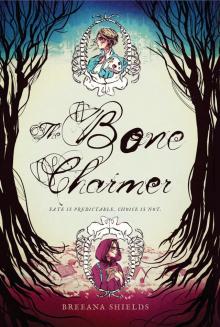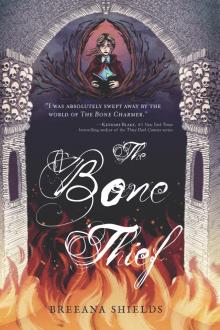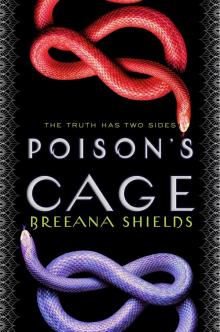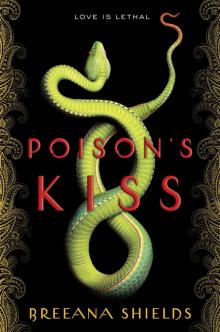- Home
- Breeana Shields
The Bone Charmer
The Bone Charmer Read online
BREEANA SHIELDS
The Bone Charmer
FATE IS PREDICTABLE.
CHOICE IS NOT.
Begin Reading
Table of Contents
About the Author
Copyright Page
Thank you for buying this
Page Street Publishing Co. ebook.
To receive special offers, bonus content,
and info on new releases and other great reads,
sign up for our newsletters.
Or visit us online at
us.macmillan.com/newslettersignup
The author and publisher have provided this e-book to you for your personal use only. You may not make this e-book publicly available in any way. Copyright infringement is against the law. If you believe the copy of this e-book you are reading infringes on the author’s copyright, please notify the publisher at: http://us.macmillanusa.com/piracy.
FOR MY MOM. WHO IS STRONGER THAN SHE KNOWS AND FOR MY DAD. WHO I MISS EVERY DAY
Saskia
Tomorrow my future will be decided by my dead gran’s finger bones. It’s how my whole life has been determined—with bones and blood and snapping flames. When I was five days old, my mother dangled me over a stone basin that was heavy with the shoulder blades of an ox and pierced my heel with a sewing needle. I’m not sure how many drops of blood splashed into the basin. One? Two? Ten? It doesn’t matter. It was enough blood to infuse the bones with my essence. Enough blood to tell my mother anything she wanted to know about the next few years of my life.
It’s always been a prickly thing between us, her insight and my ignorance. And the other way around, too. The bones can’t show her my heart.
I creep down the stairs toward the sharp scent of sage incense, a sure sign my mother is consulting the bones about one thing or another. It’s almost impossible to sneak up on her, but I can’t resist trying. Maybe if I know what she’s up to, I’ll have some hint about what the morning will bring.
The deep voice that resonates from below surprises me so much that I nearly forget to avoid the creaky fifth step. My mother isn’t alone—one of the townsfolk must have arrived for a last-minute reading before the kenning tomorrow. I sag against the wall, disappointed. I don’t care about knowing any future except my own.
Yet the sound of bone scraping against stone propels my feet forward. When I reach the bottom of the staircase, I peek around the corner.
My mother sits in the center of the room across from one of Midwood’s most prominent farmers, Mikkel Hemming. A stone basin rests on the floor between them, filled with a handful of animal bones that, from the looks of them, are probably cheaply prepared and not especially powerful. A casual reading then. Nothing like the ceremony and solemnity that always permeates the kenning. My mother isn’t even wearing her Bone Charmer robes.
“Thank you for seeing me on short notice,” Mikkel says. “The moment I touched the soil this morning, I knew I better come see you. I’m worried it’s too wet for planting asparagus.”
“It’s no trouble at all,” my mother says. She pricks Mikkel’s index finger with a needle and squeezes a few drops of blood onto the bones. Then she uses a bit of flint and a stone to light a small fire in the basin.
The room tilts and I squeeze my eyes shut. Minutes seem to pass and then, beneath my closed eyelids, I see Mikkel at the door, his hat clutched in one hand. I startle as I hear his voice in my head, thanking my mother for her time. My eyes fly open, but to my horror my mother is still at the beginning of the reading—tipping the bones onto the rug in front of her.
My throat closes.
This hasn’t happened in years—this unsteadiness around the bones, as if the magic is like a dog on a lead, determined to reach me whether I want it or not.
And I don’t.
Dread sits in my stomach like soured milk. An image of sharp black tattoos shaped like arrowheads rises in the back of my mind and I shove it away. Gran said once that in families with long lines of bone magic—families like ours—power is like a fire that burns hotter with each new generation. She meant it to be encouraging, and she had pride in her eyes when she said it, but by then I already knew the truth—the stronger the blaze, the harder it is to control. And the faster it destroys.
Bone magic would be dangerous in my hands.
I press my knuckles to my mouth. Mikkel is still sitting silently across from my mother. Picturing anything else was only the result of an overactive imagination. Still, I don’t want to be matched as a Bone Charmer tomorrow. Surely, there’s a path more appealing for me than the constant risk of hurting someone I’m supposed to help.
“You’re right, Mikkel.” My mother’s voice snaps my attention back to the present. “If you plant asparagus, you’ll have an outbreak of purple spot that will cost you most of the crop. I’d recommend something else this year—perhaps corn.”
Mikkel sighs and rakes a hand through his hair. “That’s what I was afraid of.”
She gives him an apologetic smile. “Sorry to be the bearer of bad news.”
He climbs to his feet. “Better to know now,” he says. “Thank you, Della.”
I push my back against the wall as she walks him to the door and closes it softly behind him. I edge slowly up the staircase.
“I know you’re there, Saskia. Don’t bother trying to slink away.”
My cheeks suffuse with heat. I descend the rest of the stairs two at a time and round the corner to find my mother with her hands on her hips and a reproachful expression on her face. “You know better than to spy on a reading. I take confidentiality very seriously.”
“I hardly think Mr. Hemming’s choice of crops is a secret.”
Her lips press together in a pale line. “Would you want someone sitting in on your reading tomorrow?”
At the mention of the kenning, my stomach twists. “I don’t want to be a Bone Charmer,” I tell her. “You know that, right?”
She shakes her head and walks away. I follow her to the kitchen, where she picks up an apple from the bowl on the table and slices off a section with a knife.
“Mother?”
“The kenning isn’t for determining what you want, Saskia. It’s for determining what’s best for you. And for the country.” She pops a piece of the fruit into her mouth.
“What’s best for me is to have some measure of happiness,” I tell her.
She chews maddeningly slowly and swallows before she answers. “First Sight causes more heartache than the others. Your gran’s visions always came too late to make a difference in anyone’s happiness. But maybe the bones will reveal one of the other Sights for you.”
Gran had First Sight—the ability to see the past. My mother has Third Sight—the ability to see the future—but I wish she had one of the other two Sights instead. Then I could get my kenning from a different Bone Charmer, one who wasn’t concerned with preserving the family legacy.
I open my mouth to tell her that she’s misread my concerns entirely. I’m not worried about having too little power. I already know that there’s more heartache in having too much. But if I go down this road with her, she’ll ask for explanations that I’m not willing to give.
Knowing what I want my life to look like should be enough for her.
“I don’t want a bone-matched partner, either,” I tell her. “Unless it’s …”
Her eyes narrow, and the rest of the sentence dies on my lips. “The bones don’t take requests.” Her voice is clipped, impatient. The knife moves deftly through her hands as she cuts another slice of her apple. “I should think you’d want to know as much about your future as possible. Not everyone is privileged enough to start a relationship on such sure footing.”
“I know we can afford it, but
what if I disagree with whomever the bones choose? I don’t want to be stuck with someone I don’t love for my whole life.”
“Don’t be melodramatic, Saskia. No one is stuck with someone they don’t love. Bone-matched or not.”
Anger flares in my chest at her cavalier dismissal of my worries. It’s true that no one is forced to accept a bone-matched partner, but it’s that or a life spent alone. No one wants a mate who was fated for another.
I slam a fist down on the table and my mother startles. Good. At least it’s an expression besides the calm mask of certainty she usually wears.
“Can’t you just consider my wishes tomorrow?” I ask her. “Please?”
“And what are you wishing for, exactly?”
“It might be nice to be matched as a tutor.”
All the tutors I’ve ever known have outlived both their hearing and their eyesight. Even when they’ve made mistakes, none of them have ever hurt their pupils with anything more than a sharp tongue or unrelenting high standards. It’s the safest vocation I can think of.
“That’s an interesting choice,” my mother says. “And certainly something worth considering.” She slices off another piece of apple and offers it to me. It’s a poor substitute for a promise, but it’s the most she’s willing to give.
The next morning dawns bright and cold.
The townsfolk are gathering in the square, shoulders hunched against the chilly bite of the early spring morning. Those of us turning seventeen this year are milling around the Marrow—the circular stone hut where my mother waits with the velvet-lined boxes that hold our futures.
There are eighty-three candidates this year—forty-one boys and forty-two girls—and a box for each of us. I counted them myself, fingers trailing over silver scrollwork and polished wood, all while a cord of anxiety cinched tighter and tighter around my neck. All of us will at least have a chance to be matched with an apprenticeship today. Not like several years back, when one box was missing and Callum Elliot didn’t show up to the kenning. He was the youngest of ten children, and by the time he turned seventeen, his family couldn’t afford anything more than mouse bones. My mother offered to waive her fees, but it wasn’t enough. Between the hefty cost of bone preparation and the kenning tax charged by the council, the family couldn’t scrape together enough coin.
In the end, it probably wouldn’t have made a difference. Mouse bones were unlikely to work well for such an intricate reading. But even the most expensive, well-prepared bones can sometimes fail to produce a clear kenning.
The possibility is a weight on every heart—no one wants to be a leftover.
I have the opposite problem as Callum. Affording a bone reading—any bone reading—has never been a concern for me. But my worry is useless now. I won’t get another chance to appeal to my mother before my reading, so I try to focus on something else instead—the hundreds of brightly colored paper lanterns hanging from spindly branches; the giant bonfire in the distance; the children with arms full of snowy-white blankets, bouncing on their toes from either cold or excitement.
“Saskia.” A familiar voice sends a thrill racing up my spine.
Declan’s breath dances against my neck. He probably shouldn’t be standing so close to me. Not yet. What if one of us is bone-matched with someone else? The thought opens a pit in my stomach. My mother wouldn’t dare. Not when she knows how we feel about each other.
I step out of Declan’s reach before I spin to face him. A wide grin notches a dimple on his left cheek, and his vibrant green eyes spark with mischief. He has combed his normally unruly hair into submission, save for a disobedient whorl just above his forehead that makes him look like a kitten that’s been freshly groomed by its mother.
“Morning,” I say. He lets his gaze hold mine for a beat too long, and my cheeks flush. Another slow smile creeps over his face like drizzling honey.
“I’ll be waiting for you over there.” He winks at me before he walks away. I glance at the other girls to see if anyone noticed the brief impropriety, but no one is paying any attention to me. It’s the kind of day where our thoughts are only of ourselves.
I watch Declan until he is swallowed up by the crowd of boys, my heart swelling before worry shrinks it again. I should know better than to love anyone before the bones have spoken. But there’s something about Declan—his easy smile, his full-bodied laugh, the carefree way he approaches life, as if he has no doubt that fate will always work in his favor. If anyone is confident about the results of the kenning, it should be me. But I’m not. Not at all.
Movement at the edge of the courtyard catches my attention. A lone figure strolls toward the throng of candidates. Bram Wilberg.
Late to the kenning.
He stops short of the Marrow and settles beneath the shade of a giant oak tree, right where a wide expanse of grass borders the cobbles. He closes his eyes and tips his face toward the sky, resting his mop of chestnut hair against the tree trunk and folding his muscular arms over his stomach. No one approaches him. When it comes to Bram, everyone steers clear.
Especially me.
A breeze trembles through the cherry blossom trees and petals drift onto my hair and shoulders like pale pink snow. I close my eyes and breathe them in. The subtle fragrance has always been intertwined in my mind with springtime and new beginnings and the kenning day.
I never imagined being this nervous.
A hand falls on my shoulder and I turn to find Ami, her eyes shining with excitement. The muscles in my back unwind, and I pull her into a quick embrace. “You’re late,” I say, my voice muffled against her collar. “I was starting to worry I’d have to do this alone.”
The bones chose Ami as my friend before either of us could walk. Our lives are woven together like the strands of a rope.
Ami pulls away. “Sorry,” she says, circling her hand in the air near her head. “Mama wouldn’t stop fussing.” Her dark hair is swept away from her face and pulled into a twist, and her cheeks are pink from the cold. She wears a lemon-yellow cloak that flatters her complexion. I finger the ends of my hair. It hadn’t occurred to me to do something special with it today. Then again, my mother wasn’t at home to help me get ready. She left before dawn to prepare for the kenning. I wonder what it must be like—to have a mother invested in your present instead of your future. A mother whose only task on a morning like this is to braid your hair and hope for a result that will make you happy.
“Has your mother given you any hints about what’s going to happen?” Ami asks, as if she can read my thoughts. The question bumps into something raw inside me.
“No,” I say. “She won’t tell me anything.”
Ami squeezes my fingers. “I guess we’ll find out soon enough.”
As if on cue, the bugle horn sounds and a hush falls over the square. It’s time. All the candidates start moving closer to the Marrow. I can almost feel the anticipation rolling off Ami. She has nothing to worry about because she will be happy with any outcome. What’s meant to be will be, she always says. But my stomach feels like a clenched fist.
“Good luck, Saskia.” Ami plants a quick kiss on my cheek before taking her place in line. It’s an ironic wish, considering that luck is the very thing we’re trying to outfox. But I return the sentiment anyway.
I look around for Declan and when I find him, his eyes are already trained on me. I offer him a shaky smile, but his grin is unfaltering. I try to remember if he was always this certain of the future. For the past year he has been, I know that much. He has whispered it against my ear in stolen moments, promised it to my fingers in fleeting touches. His confidence is like a shelter against the storm that rages inside me. I can envision a life—a safe life—by his side. And it doesn’t hurt that the sight of him hurries the blood through my veins.
The first girl in line—Meisha—disappears into the cottage. We watch her go, a thousand pairs of eyes glued to the closed door, afraid we might miss something if we blink. Silence hangs over the square for a few
minutes, but soon the expectation of a quick answer fizzles away. Children begin shuffling their feet. Mothers and fathers whisper to each other, no doubt fretting about the pairings. Some of the candidates dress up their worry in banter—elbows nudging ribs, heads thrown back in exaggerated laughter. But others don’t speak. Some of us won’t have a clear enough result to be matched with an apprenticeship today; others won’t be happy with their reading.
Meisha is probably only gone for ten minutes, but it feels like days. She steps out of the Marrow with her eyes cast down, and at first I think she’s crying. But then she looks up and a shy smile spills across her face. Good news, then.
Instead of heading toward the bonfire, she walks to where the boys are standing with abruptly stony expressions. A chorus of gasps ripples over the crowd. Meisha’s parents must have paid handsomely to secure a matchmaking reading along with her kenning. Most of the townsfolk save for years just to afford a bone match for an apprenticeship. Only the wealthiest can pay for a bone-matched partner, too.
Meisha holds out her hand to Bunta and the square erupts in applause. A love match is always cause for celebration.
Watching the new couple walk toward the bonfire hand in hand fills me with bittersweet longing. What a gift to have so much confidence in fate. I hope my own reading won’t include a matchmaking—I want to be chosen because I’m loved, not because fate decrees it—but I’m not optimistic. My mother has never been able to resist knowing my future, no matter the cost. I wrap my pale, unmarked arms around my middle. I wonder how long it will take for the slender red tattoo to etch itself around Meisha’s wrist. I wonder if it already has.
One of the children races forward with a teetering stack of pale blankets. Bunta plucks one from the top of the stack, and he and Meisha settle in front of the snapping fire to have their first conversation as intendeds. I sneak a look at Declan, but he’s not watching me this time.

 The Bone Charmer
The Bone Charmer The Bone Thief
The Bone Thief Poison's Cage
Poison's Cage Poison's Kiss
Poison's Kiss